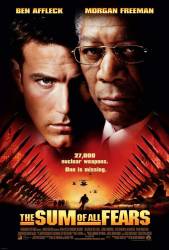Factual error: A force of Russian Tu-22 Backfire bombers attacks the aircraft carrier USS John C. Stennis (CVN-74) by sneaking in under the ship's radar. This is all well and good except that carriers usually don't use their own radar, they have Airborne Early Warning aircraft (E-2 Hawkeye's) that can see much further and not give away the carrier's position (let alone the F-14s which would be patrolling too) not to mention the fleet of destroyers other ships guarding the carrier. The whole point is, the US Navy practiced and planned for such a "carrier versus Backfire" battle for years. I guess in the interest of furthering the plot Hollywood has to ignore the immense measures the USN takes to protect those multi-billion dollar assets, not to mention the 5000+ sailors that man them.

The Sum of All Fears (2002)
Ending / spoiler
Directed by: Phil Alden Robinson
Starring: Morgan Freeman, Ben Affleck, Liev Schreiber, James Cromwell, Philip Baker Hall, Alan Bates, Ken Jenkins, Ian Mongrain, Russell Bobbitt
The nuclear bomb goes off about 2/3 into the film. Morgan Freeman dies. Ben Affleck convinces the Russians to back down first, thus saving the world.
Jack Ryan: General, the President is basing his decisions on some really bad information right now. And if you shut me out, your family, and my family, and twenty-five million other families will be dead in thirty minutes.
Trivia: When Bill Cabot meets John Clark at the airport in the rain, it was Liev Schreiber's idea to have Clark waiting without an umbrella.
Question: Now i don't know much about missiles and such, but in the scene where the Israeli fighter jet is carrying the nuclear warhead, and is then shot down, well wouldn't the bomb blast that destroyed the plane also detonate the nuke attached as well? correct if i am wrong.
Join the mailing list
Separate from membership, this is to get updates about mistakes in recent releases. Addresses are not passed on to any third party, and are used solely for direct communication from this site. You can unsubscribe at any time.
Check out the mistake & trivia books, on Kindle and in paperback.




Answer: Nope. A nuclear detonation requires a highly specific sequence of events to occur within the bomb - an explosion nearby wouldn't come close to producing those conditions. The construction of a nuclear bomb requires components to be placed in a highly specific configuration - damage to the bomb would disrupt that configuration and make it effectively impossible for the bomb to go off.
Tailkinker ★